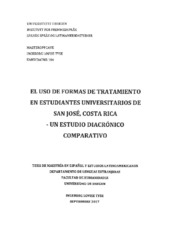El uso de formas de tratamiento en estudiantes universitarios de San José, Costa Rica - un estudio diacrónico comparativo
Master thesis
Permanent lenke
https://hdl.handle.net/1956/16732Utgivelsesdato
2017-09-28Metadata
Vis full innførselSamlinger
Sammendrag
The aim of this study is to describe and analyze the use of forms of address among students of the University of Costa Rica in San José, and to describe and analyze changes that may have occurred during the last two decades, comparing my results to those of a similar study carried out in 1995. In other words, this is a diachronic comparative study. The method used is mainly quantitative, based on interviews with 100 informants, both male and female, but it also has qualitative elements in the form of comments and explanations on pronoun use by the informants. Brown and Gilman’s theory of the importance of the psychosocial dimension of power and solidarity in the use of forms of address has been used to analyze the results. The results indicate that several changes have occurred in the last two decades. There is a clear tendency towards more ustedeo, both in family relations and in relations that are more distant. There is also a tendency towards a more frequent, though still limited, use of the pronoun tú, which can now be found in all kinds of relations as the preferred form, whereas in 1995 it was only found used in variation with vos and/or usted, and not in all kinds of relations. In 1995 a variation between different pronouns in the same relations was more common than it is now. The use of forms of address between novios – boyfriends and girlfriends – was also investigated in this study, although it was not part of the 1995 study, and by consequence nothing can be concluded about changes in these relations. However, I have ventured to assume that there have been changes here, based on the development in pronoun use between close friends shown by my results. The use of the pronoun tú between novios is remarkably high compared to the quite limited use of this pronoun in other relations, a phenomenon which would be particularly interesting for further investigation.
